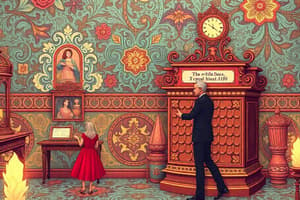Podcast
Questions and Answers
Which employees may be exempt from receiving overtime pay for working more than 40 hours a week?
Which employees may be exempt from receiving overtime pay for working more than 40 hours a week?
- Employees in the healthcare industry
- Employees in the technology industry
- Exempt employees (correct)
- Non-exempt employees
Which group of clergy may be exempt from Social Security and Medicare taxes?
Which group of clergy may be exempt from Social Security and Medicare taxes?
- Clergy in religious orders (correct)
- All clergy
- Clergy employees
- Self-employed clergy
What type of income is reported on Schedule B for clergy?
What type of income is reported on Schedule B for clergy?
- Interest and dividends (correct)
- Salary
- Offerings and fees
- Housing allowance
What type of leave are employees entitled to for family and medical reasons?
What type of leave are employees entitled to for family and medical reasons?
How can clergy reduce self-employment taxes?
How can clergy reduce self-employment taxes?
Which employees must pay self-employment taxes and file their own tax returns?
Which employees must pay self-employment taxes and file their own tax returns?
Are non-order clergy exempt from Social Security and Medicare taxes?
Are non-order clergy exempt from Social Security and Medicare taxes?
What type of income is subject to income taxes for self-employed clergy?
What type of income is subject to income taxes for self-employed clergy?
Which employees may be exempt from certain taxes and eligible for tax credits?
Which employees may be exempt from certain taxes and eligible for tax credits?
Flashcards are hidden until you start studying
Study Notes
- Special tax rules apply to certain employees based on their industry, state, and type of employment.
- Overtime pay may not always apply to exempt employees who work more than 40 hours a week.
- Employees are entitled to unpaid leave for family and medical reasons, and the amount varies by state.
- Paid sick leave is available to employees, and the amount varies by state.
- Employees can deduct certain job-related expenses from their taxes.
- Tax credits, such as the EITC and Child Tax Credit, are available to eligible employees.
- Self-employed employees must pay self-employment taxes and file their own tax returns.
- Employees of foreign employers may be subject to different tax rules and filing requirements.
- Employees of religious organizations may be exempt from certain taxes and eligible for tax credits.
- Government employees may have different tax rules and filing requirements.
Studying That Suits You
Use AI to generate personalized quizzes and flashcards to suit your learning preferences.




